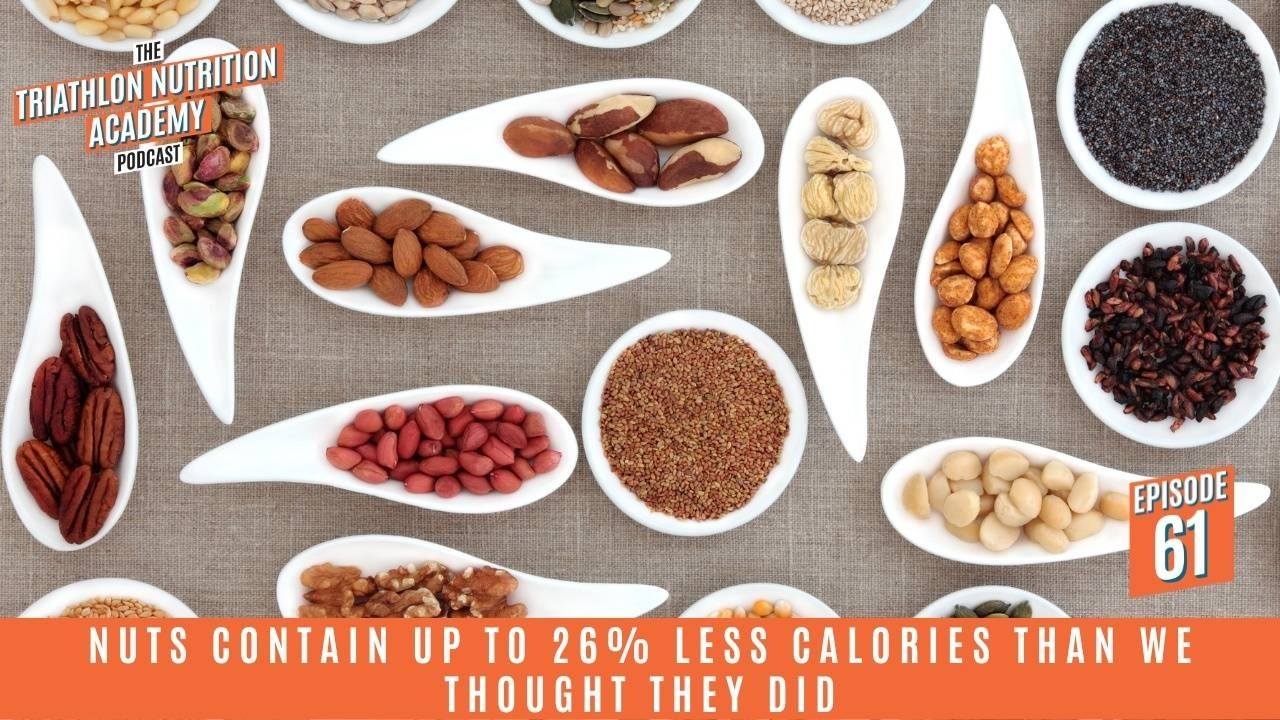New research: Nuts contain up to 26% less calories than we thought they did

If you are a triathlete who counts calories this is important to know so you can ensure you’re getting the kilojoules you need when consuming nuts.
The Atwater System (introduced over 100 years ago) is the system used globally for calculating the total energy value (kcal/kJ) of foods.
- Measures available energy of a food – they burn it in bomb calorimeter and factor in faecal and urine losses
- It determines kilojoules (kJ) based on grams of fat, protein, carbohydrate and alcohol in a particular food
- Carbohydrate and protein ~4kcal/g : CHO (3.87 – simple sugars) (3.57-4.12 – complex CHO) rounded to 4
- Fat 9kcal/g
- Alcohol 7kcal/g
However, new research out of the University of Wollongong (and presented at the Dietitians Australia conference last month) found that the actual kilojoule, or calorie content of nuts, that we actually absorb in our body, is significantly less than what's on the food label - up to 26% less calories!
They found:
- Almonds had 18 1/2 kilojoules per gram when they were actually absorbed in the body - which is 26% less than what's measured by the Atwater system.
- Walnuts had 21.8 kilojoules per gram - which is 22% less.
- Cashews had 20.5 kilojoules per gram - which is 14% less than what's measured.
- Pistachios had 22.6 kilojoules per gram - which is 5% less than measured by the Atwater system
As an Advanced Sports Dietitian it’s my job to understand the science and deliver it in a way that’s useful and easy to understand. So here’s what you need to know:
The Atwater system of measuring energy and calories of food is flawed – it doesn’t take into consideration what happens inside our gut and how our body metabolises food.
Nuts and seeds have a tough fibrous outside, cell walls – we don’t fully break them down to extract the energy from them. Or absorb the fat. A portion remains ‘locked’ into their fibrous cell walls – and is excreted out.
Whole flaxseeds – often go in one end and out the other completely unchanged. It’s the gut’s self-defence mechanism.
When it comes to getting goodness and nutritional value from nuts, I’ll often suggest LSA mix (linseed, sunflower seed, almond) or nut meals so that you’re more likely to get the nutrition out of them.
Another tick in the NO box for why calorie counting is not particularly useful. So if you're putting 30 grams of almonds into your calorie counting device, it's going to give you the amount of kilojoules or calories determined by the Atwater system - which we now know is up to a quarter less than that. So if you haven't listened to my episode around why you don't necessarily need to count calories as a triathlete, go back and listen to Episode 59.
So don't be afraid of including nuts and seeds in your diet. They are really good fats. And the more different varieties of nuts and seeds that you can include, the better. They have a different profile of fats - mono, polyunsaturated, unsaturated fats
A healthy serving that we should be including daily is 30 grams, or a bit over an ounce (1.06 ounces is 30 grams)
Only 2% of Australians eat the recommended 30 grams serving of nuts a day, potentially because they think it's going to cause weight gain. But a massive study showed that eating nuts is not linked to weight gain, or higher BMI or increased body fat. So nuts aren't going to make you fat.
Not only will they not cause weight gain, eating them regularly has been associated with:
- 22% reduction in risk of premature death
- 29% reduced risk of coronary heart disease
- 21% reduced risk of cardiovascular disease, and
- 13% reduced risk of developing Type II diabetes.
So if you're not including nuts and seeds in your diet, because they're too high in calories, you can scrap that information and start increasing your intake to at least 30 grams a day to get all of those health benefits and huge range of nutrients.
Take a listen to this week’s episode of the Triathlon Nutrition Academy podcast to delve deeper into the nutritional value of nuts.
And to hear more on why I don’t think you need to calorie count as a triathlete, listen to Episode 59 HERE
LINKS
Read the 2012 study on almonds HERE
The American Journal of Clinical Nutrition, Volume 96, Issue 2, August 2012, Pages 296–301, https://doi.org/10.3945/ajcn.112.035782
To dive deeper, listen to the Triathlon Nutrition Academy Podcast, EP 61 - New research: Nuts contain up to 26% less calories than we thought they did
If you are interested in learning more about the Triathlon Nutrition Academy Program and what it can do for you, head HERE to join the waitlist for our next opening in January.




